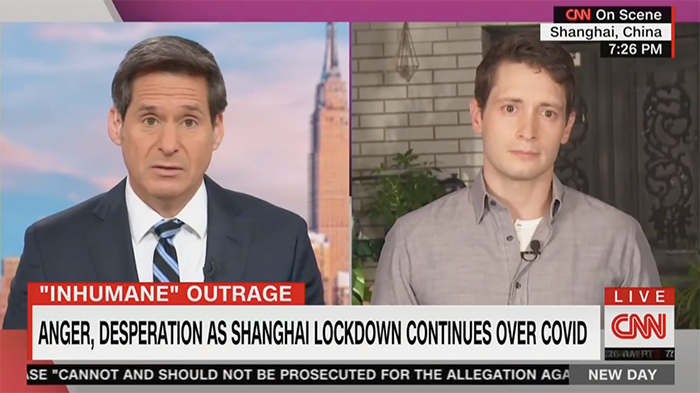WASHINGTON — The Chinese government has stopped renewing press credentials for foreign journalists working for American news organizations in China and has implied it will proceed with expulsions if the Trump administration takes further action against Chinese media employees in the United States, according to six journalists and U.S. officials with knowledge of the events and statements on Monday by a Chinese Foreign Ministry spokesman.
The actions and threats raise the stakes in the continuing cycles of retribution between Washington and Beijing over news media organizations. Those rounds of retaliation are a prominent element of a much broader downward spiral in U.S.-China relations, one that involves mutually hostile policies and actions over trade, technology, education, diplomatic missions, Taiwan and military presence in Asia.
American news organizations immediately affected by China’s latest actions are CNN, The Wall Street Journal, Bloomberg News and Getty Images. Journalists from all four organizations tried to renew press cards with the Foreign Ministry in the past week, but were told the cards, which are usually good for one year, could not be renewed. In total, at least five journalists in the four organizations have been affected so far.
One journalist said Foreign Ministry officials told him that his fate depended on whether the United States decided in the fall to renew the visas of Chinese journalists working in America who are under new visa regulations imposed by the Department of Homeland Security in May. Other journalists have received similar messages.
The journalist said he was told by Chinese officials that if the Trump administration decided to expel Chinese journalists, Beijing would take reciprocal action. Many of the Chinese journalists work for state-run news organizations.
The Foreign Correspondents’ Club of China said in a statement Monday that it was “very alarmed” at the halt in press credential renewals.
“These coercive practices have again turned accredited foreign journalists in China into pawns in a wider diplomatic conflict,” it said. “The F.C.C.C. calls on the Chinese government to halt this cycle of tit-for-tat reprisals in what is quickly becoming the darkest year yet for media freedoms.”
The organization noted that the Chinese government had already expelled 17 foreign journalists in the first half of 2020 — including seven from The New York Times — by canceling their press credentials. The group said it expected more China-based journalists to have their press card renewal process halted by the Foreign Ministry this fall.
Foreign journalists working in China must renew their press cards to get new residence permits from the Public Security Bureau, the main police organization. The residence permits are the equivalent of visas that allow foreigners to live in China. The journalists with expired press cards were told by police officials after their discussions with Foreign Ministry officials that they would be given residence permits that are good until November 6.
They were given letters from the Foreign Ministry that said they could continue to work in China for the time being despite the expired press cards, according to a copy of one such letter obtained by The New York Times.
The November 6 end point for the residence permits corresponds to when the Trump administration might decide not to renew visas for many Chinese news media employees in the United States, which would result in their expulsions.
In May, the administration announced that all Chinese journalists would now have 90-day work visas — a significant reduction from the open-ended, single-entry visas they had gotten previously. The journalists would be allowed to apply for extensions of 90 days each. In early August, the visas expired, but the Department of Homeland Security, in consultation with the State Department, did not expel any of the Chinese journalists or renew their visas, which meant they got a de facto extension of 90 days, according to the language of the new regulation.
They can continue to live and work in the United States until early November — the same week as the U.S. elections — as they await word on their renewal applications. But American officials could also decide to expel some of them sooner. Officials consider many of the Chinese employees to be propaganda workers and, in a few cases, maybe even spies. More than 130 Chinese journalists and news media employees have been affected.
Chinese diplomats are concerned about the potential expulsions and have spoken to their American counterparts.
China’s recent freezing of press card renewals has affected citizens from a number of countries working for American news organizations. They include David Culver, the only CNN correspondent in China, who is American; Jeremy Page, a British correspondent for The Wall Street Journal; and Andrea Verdelli, an Italian freelance photographer whose credential is with Getty.
After the Times first reported on Sunday on the Chinese government’s new restrictions, Bloomberg News posted an article that said two of their journalists were affected, without stating their nationalities. The Wall Street Journal also posted a story confirming the status of Mr. Page.
CNN released a statement on Sunday that said: “One of our Beijing-based journalists was recently issued a visa valid for two months, instead of the usual 12. However, our presence on the ground in China remains unchanged, and we are continuing to work with local authorities to ensure that continues.”
In Beijing, Zhao Lijian, a spokesman for the Chinese Foreign Ministry, accused Washington on Monday of being “arrogant and unreasonable” in its negotiations with China over the renewal of visas for Chinese journalists in the United States.
He said the freezing of press credential renewals was a reciprocal move on China’s part, and warned that “all cards were on the table” — a hint that Beijing was prepared to expel the journalists if it deemed necessary.
“If the U.S. government really cares about American journalists, it should extend visas for all Chinese journalists as soon as possible, instead of kidnapping journalists from the two countries as hostages,” Mr. Zhao told reporters in a daily briefing.
Morgan Ortagus, a State Department spokeswoman, said in a statement on Sunday that the Chinese Foreign Ministry had recently told the U.S. Embassy in Beijing that it was denying press card renewals to foreign journalists and refusing to process pending visa applications for journalists who were expelled earlier this year.
“The United States is of course troubled that these proposed actions by the P.R.C. will worsen the reporting environment in China, which is already suffering a dearth of open and independent media reporting,” she said, referring to the People’s Republic of China.
There are American news organizations that have not been affected by China’s new limits yet because their journalists’ press cards have not come up for renewal. This is the case with the one New York Times foreign correspondent, an American, who remains in mainland China.
The Chinese government put a similar freeze on press card renewals in late 2013 for journalists from The Times and Bloomberg News because of sensitivities involving coverage. The halt on renewals led to fears of mass expulsions and efforts by Joseph R. Biden Jr., then vice president, to stress to Chinese leaders the importance of a free press during a visit to Beijing. The Chinese government eventually renewed those press cards and granted new residence permits, but refused to issue visas for any new incoming journalists from the two organizations for a couple of years.
This March, China expelled almost all American journalists for The Times, The Wall Street Journal and The Washington Post from mainland bureaus. That was done after the State Department told five Chinese state-run news organizations they could employ a total of only 100 non-Americans, which resulted in the expulsions of 60 Chinese workers from the United States. Earlier, in February, Washington designated those five organizations diplomatic entities, requiring them to turn over lists of their employees and property assets. (It designated four more Chinese organizations in June.)
On Feb. 19, the day after Washington made the first round of designations, Beijing announced the expulsions of three Wall Street Journal reporters, the first such outright evictions of journalists since 1998. Chinese officials said they took action because of what they called an inflammatory headline — “China Is the Real Sick Man of Asia” — on a Journal opinion column.
Chinese officials have also forced the ouster of some Chinese employees from the Beijing bureaus of several American news organizations, including The Times, The Journal and CNN.
Chinese officials have also said the journalists expelled this year cannot work in Hong Kong, a former British colony that in theory operates under a semi-autonomous governance system. But Beijing imposed a new national security law on Hong Kong in June, one that mainland and Hong Kong officials have already begun using to curb civil liberties in the territory. And in recent months, Hong Kong officials have delayed or refused to issue work permits to some foreign journalists, an occurrence that was once rare. As a result, the Times and other news organizations are moving some of their journalists based there to other cities in Asia.
American officials say their actions against Chinese news media organizations and employees are in reaction to the tightening restrictions Beijing has imposed on foreign journalists in China in recent years. Those include limiting the duration of press cards, residence permits and visas from the standard length of one year to as short as one month in cases where Chinese officials seek to punish a reporter or try to get a news organization to self-censor.
Some Trump administration officials are intent on steering the U.S.-China relationship toward a course of permanent competition and confrontation, one they hope will be difficult to reverse even if President Trump loses to Mr. Biden in the November election. Mr. Trump cares about maintaining robust trade with China and has praised Xi Jinping, the Chinese leader. But he has become more openly critical of China in the run-up to the election, because his strategists see it as an issue that can help divert voters away from the president’s vast failures on the coronavirus pandemic.







